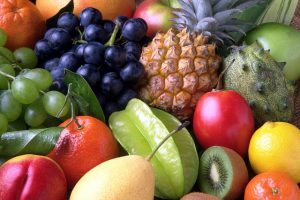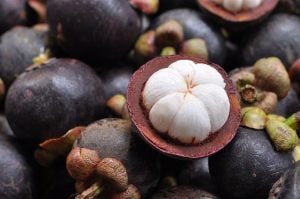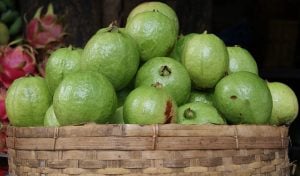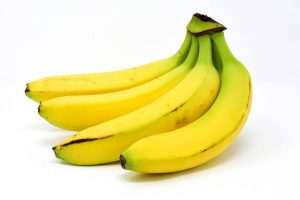When you hear the word Blackberry probably the first thing that comes to your mind is the smart phone brand of the same name. But blackberry is not just a brand name but an actual fruit.
It’s not exactly popular in Kenya as it is in the west, but nonetheless it can be found in some parts of the country, often being eaten by kids and rarely by adults. So what is this fruit, and where does it come from?
The Blackberry plant is a thorny and bushy shrub, though thornless types exist. It’s often found in the wild or grown as hedge, but in some countries such the US and Mexico it’s grown on a commercial scale.
The berries grow in aggregates, and one “fruit” can hold between 80 and 100 small fruits. The fruits when unripe are green and become red when ripe and later on black when fully ripe. They are very delicious and have a pleasant flavour, however those that are not fully ripe are a bit bitter and less juicy.
The fruits are usually eaten fresh or crushed to make juice but are also processed to make products like jam, wine, ice cream, desserts, seedless jellies and baked items. Pigments are also extracted from these fruits and used as a natural colourant in food products like baked items, chewing gums, fruit wines etc.
Apart from its fruits, the leaves of the blackberry plant are used for making tea, the cooked root as food and the young shoots in salads after peeling.1
Nutrient Content of Blackberries
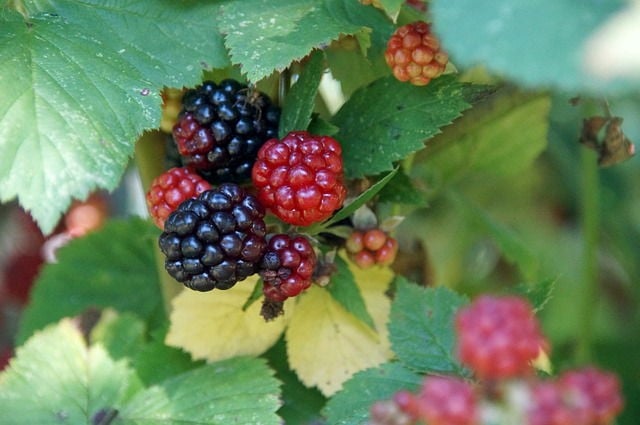
Some significant nutrients found in the blackberries per 100g are as follows:
- Water – 88.15g
- Energy – 43 kcal
- Fibre, total dietary – 5.3g
- Total Sugars – 4.88g
- Vitamin C, total ascorbic acid – 21.0mg
- Calcium – 29mg
- Magnesium – 20mg
- Phosphorus – 22mg
- Potassium – 162mg
- Folate – 25µg
- Vitamin A, IU – 214 IU
- Vitamin K (phylloquinone) – 19.8µg
Source: USDA National Nutrient Database
Blackberries are a rich source of carbohydrates, which are present mostly as sugars. This makes the fruit not only sweet, but also a high source of energy.1
Blackberries are rich sources of vitamin C, vitamin K, Folic Acid (Folate) and dietary fibre. They also contain other important nutrients like manganese, vitamin A, potassium, vitamin E, niacin, iron and zinc.
Blackberries are also said to contain high levels of polyphenols (phenols, flavonoids and anthocyanins).
Potential Health Benefits of Blackberries
1. Antioxidant Activity
Blackberries are a rich source of antioxidants due to their high content of polyphenols. They also contain significant amounts of vitamin C which is also an antioxidant.
Antioxidants scavenge and inhibit free radicals and therefore are said to prevent diseases like cancer, cancer, cardiovascular diseases and neurodegenerative diseases.
It has also been indicated that’s there’s a significant relationship between antioxidant activity, antioxidant content and anti-cancer activity in blackberries.1
2. Fibre for a Healthy Digestive System & Disease Prevention
Blackberries are a surprisingly rich source of fibre, even compared to other fruits. Just one 100g of blackberries will provide 5.3g of fibre, which is about 14% of the recommended daily allowance (RDA) for fibre.
Fibre helps to keep your digestive system healthy and is said to lower the risk of chronic diseases including cardiovascular diseases, type 2 diabetes, obesity and certain gastrointestinal diseases.3
3. Vitamin C for Immunity & RBC Production
Vitamin C found in the blackberries is good for strengthening the human immune system to protect you from diseases. It’s also an important micronutrient when it comes to red blood cell production in the body, as it stimulates the absorption of iron from our intestines.
4. Folate for Pregnant Women
Blackberries contain significant amounts of folate, providing about 6% of the recommended daily allowance (RDA) per 100g.1,2
Folate is a very important nutrient, especially during pregnancy. It helps prevent cases of neural tube defects (e.g. spinal bifida) and also ensures optimal development of tissues and cells. They are therefore good additions to the diet of pregnant women.
5. Vitamin K for Blood Health
Blackberries provide moderately high amounts of vitamin K. This vitamin is important for blood clotting and as such helps to prevent excessive bleeding during injuries and increases wound healing.
Viatmin K is also said to be important for preventing cardiovascular diseases and for bone health.4
REFERENCES
1. Rubus Fruticosus L.: Constituents, Biological Activities and Health Related Uses (Full Text Available here: http://www.mdpi.com/1420-3049/19/8/10998/htm)
2. USDA National Nutrient Database for Standard Reference – Blackberries, Raw
3. Health benefits of dietary fibre (Available here: https://www.ncbi.nlm.nih.gov/pubmed/19335713)
4. 10 Important Facts About Vitamin K That You Need to Know (http://articles.mercola.com/sites/articles/archive/2004/03/24/vitamin-k-part-two.aspx)
5. Pick of the superfruits: There’s more fibre in a handful of blackberries than in two shredded wheat (Read more: http://www.dailymail.co.uk/health/article-2028240/Pick-superfruits-Theres-fibre-handful-blackberries-shredded-wheat.html)
